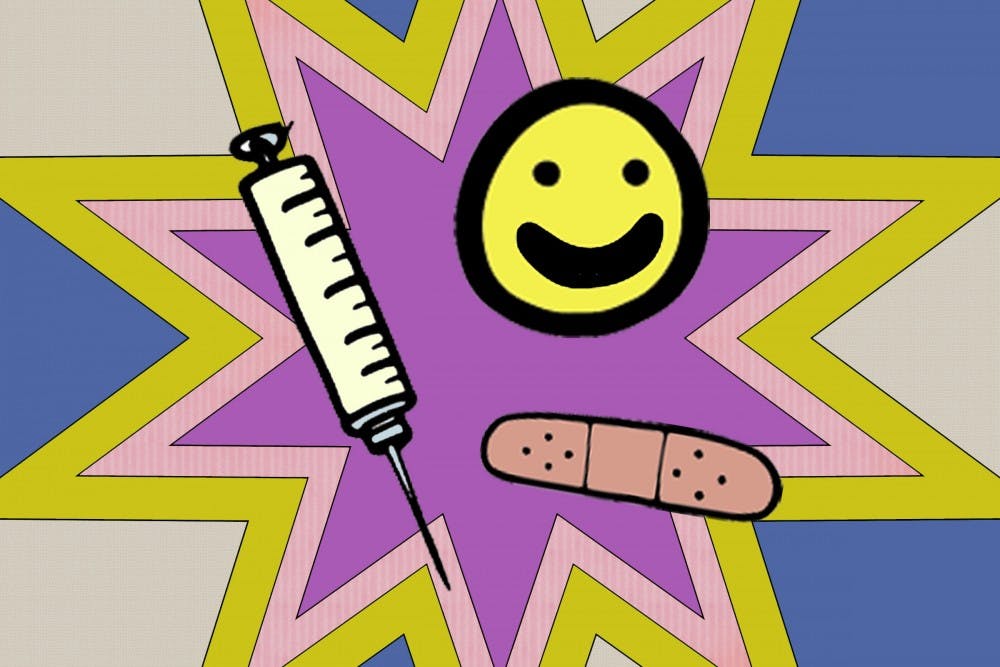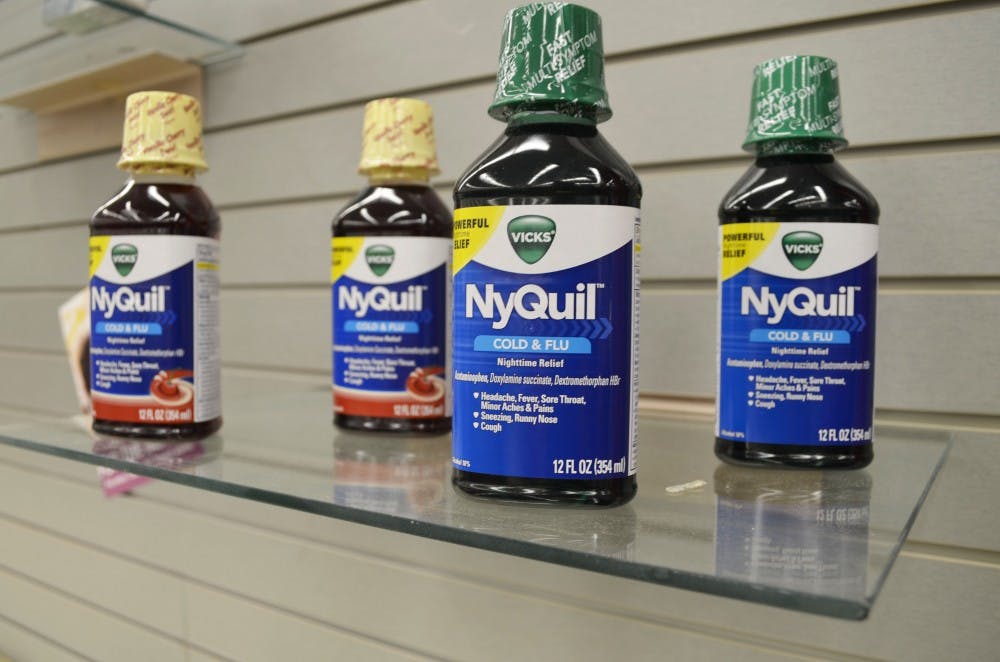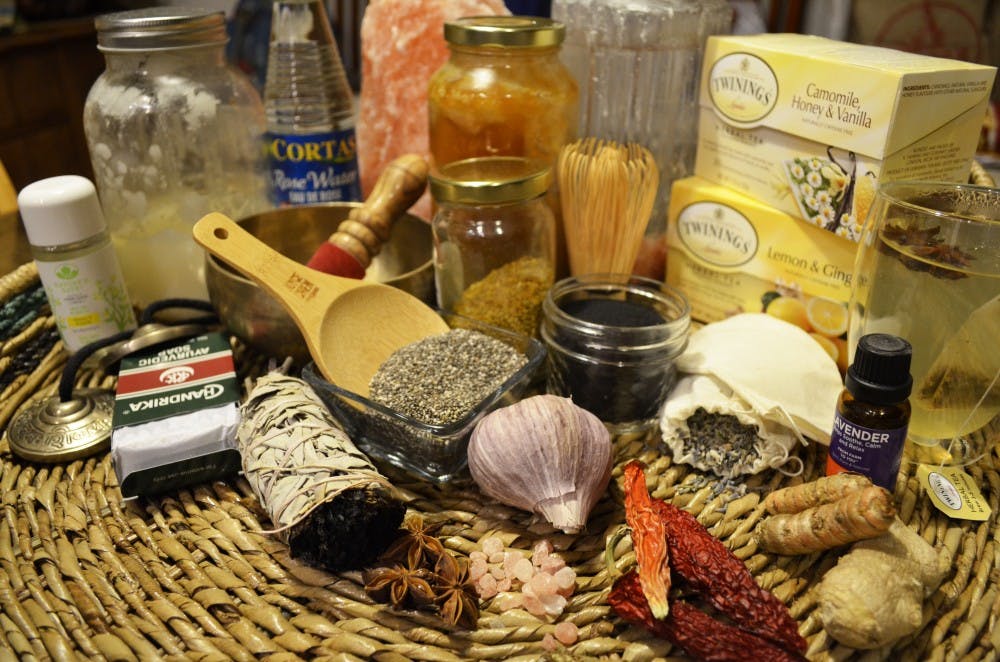She feels a pain in her chest grow heavier and heavier. Unable to catch her breath, she has a sense that something is wrong.
Scared and living on her own for the first time, she takes herself to the doctor to ensure she's alright. Luckily, her diagnosis is not life-threatening, and she is able to go home.
Just when she begins to feel better, she is hit with a case of strep throat. A cold makes its way through her system one week after that, too.
Chloe Gibbons is a victim of the unceasing college cold.
“I’m just a mess this year,” she jokingly says.
Gibbons, a junior communications major, is not experiencing anything out of the norm, according to Stefanie Schroeder, the medical director of ASU Health Services.
With finals just around the corner, it is peak season for colds and flus at the University, Schroeder says.
Schroeder says there are many factors responsible exam season inviting germs into students’ systems.
Besides the stress caused by midterms and finals, Schroeder says the proximity students have to one another plays a large role as well.
“When students are stressed and studying, that means they’re not really paying attention to their diets and sleep habits,” Schroeder says. “They are more prone to infection that way. They are also close together with other people, so viruses get spread more easily.”
College is the first time many students have to deal with recovering from a health issue on their own, Gibbons says. Without homemade soup to soothe their throat or a loved one’s words of encouragement, getting over a sickness can leave one feeling a bit lost.
Immune systems suffer when one is overwhelmed because the body shuts or slows down certain functions to fight off stress, according to Livestrong. This makes the body “vulnerable” to various infections and viruses, according to the article.
Many college students recover independently as they now live on their own, Gibbons says. Although she is an in-state student, she expresses she wanted to figure things out for herself rather than go home.
“I wanted to get better on my own since this is the first real problem I’ve had since moving out,” Gibbons says. “I had to force myself to take care of myself. My mom wasn’t there to say, ‘take this’ or ‘calm down.’”
Although her chest pain turned out to be strain, she says she believes having strep throat and a cold were byproducts of feeling overwhelmed.
Kacey Cavanagh, a sophomore nursing student, says she thinks getting sick at school poses challenges getting sick living at home does not.
“It’s definitely more stressful, which can make your sickness worse,” Cavanagh says. “It is harder to recover because you can’t miss classes as much.”
She says she has been sick plenty of times throughout her college career. Shortly after recovering from getting her wisdom teeth taken out last year, she says she caught a cold.
Although Cavanagh says she does not think being a nursing student has prepared her for preventing colds or getting better faster just yet, she has taken an interest in holistic recovery methods rather than medicinal ones.
“My mom has always taught me: lots of sleep, lots of orange juice, lots of soup,” Cavanagh says. “That’s always what I have lived on.”
Schroeder says ASU has many resources available to those students who are having health concerns. Health Services offers direct patient care at clinics on all four campuses. Schroeder says that these clinics saw 63,000 students in total last year in which upper respiratory infections were the most common case.
All students also have an education tab under their patient portal on MyASU, in which self-help tips and information about colds and flus are listed, she says.
Schroeder says three of the four campuses offer “wellness areas” to help students relieve stress as well. The Sun Devil Fitness Complexes at the Polytechnic and Tempe campuses offer services such as acupuncture, while the West campus has a massage area.
Although the Downtown Phoenix campus does not offer these services, Schroeder says the idea to bring them there has been conceptualized and is a matter of funding.
She says the health clinics accept various insurance carriers as well as offer a student plan for those who are financially independent.
“Student insurance is administered through Aetna,” Schroeder says. “It is a product that is negotiated with all three universities in Arizona: ASU, Northern Arizona University and UA. It’s a full-service plan that offers care here, at specialists and hospitals.”
Health Services also has the Bridge Plan for students who are not insured or are under-insured. It is a discount plan that costs $129 per semester with $15 co-pays at each visit and $20 co-pays for any lab work, Schroeder says.
Feeling under the weather while managing to keep up with school work and responsibilities sometimes leaves students feeling lonely, Gibbons says.
“You want to be with people, but at the same time you don’t because you don’t want to get them sick,” she says. “You don’t want to feel sad for yourself, but at the same time, you’re like, ‘Hmm ... what do I do?'”
Schroeder says it is normal for college students to be emotional while they are sick because they want someone to tell them every thing will be OK, but many live far away from their families. She says if students just ask for help, they can find many resources through counseling, groups, clubs and the Dean of Students Office.
Prevention is the best medicine, she says.
“If a student can avoid getting sick, that is going to help them succeed academically,” Schroeder says. “Getting the flu vaccine, getting plenty of rest and plenty of fluids — that’s the hallmark of all of that.”
Gibbons and Cavanagh say the importance of not being so hard on one’s self and making health a priority.
“Try not to stress too much over everything you could be doing,” Gibbons says. “Take a rest day.”
Reach the reporter at eataylo3@asu.edu or follow @emily_a_taylor on Twitter.
Like State Press on Facebook and follow @statepresss on Twitter.






